Have you ever heard of Tulsi, also known as Holy Basil? This wonderful herb has been cherished for thousands of years in Ayurvedic medicine, and it’s famed for its healing properties. Unlike a typical garden herb, Tulsi is celebrated for easing stress, boosting immunity, and adding a unique flavor to meals. Learn about the benefits of tulsi holy basil.
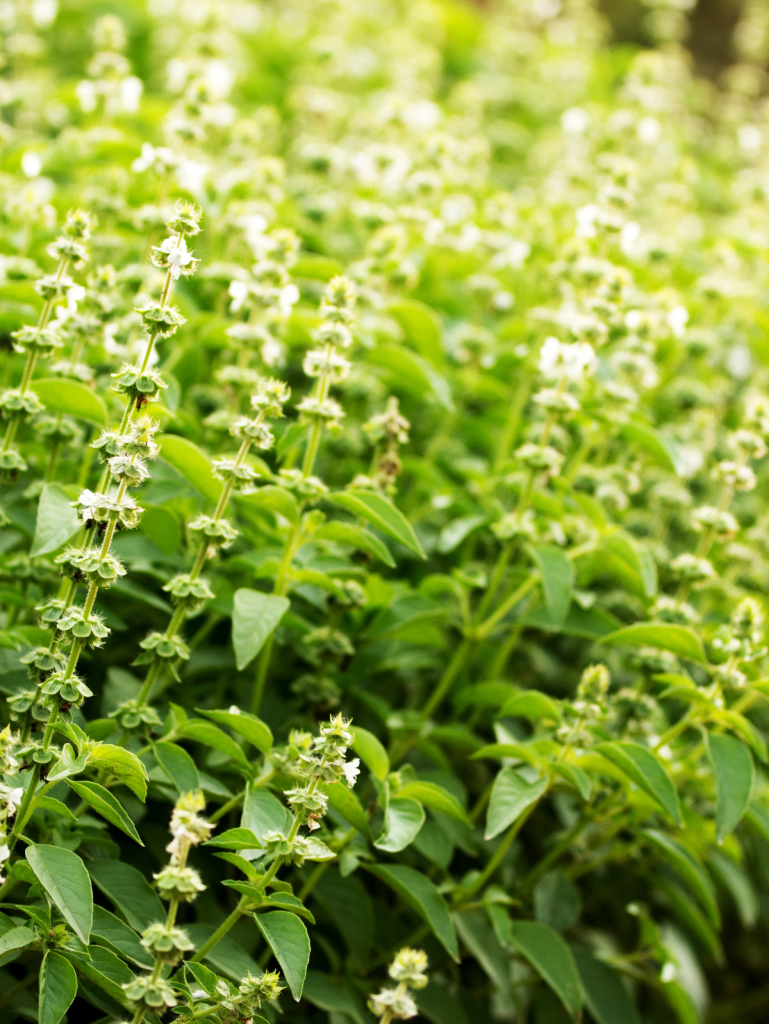
Health Benefits of Tulsi
Tulsi, also known as holy basil, is more than just a sacred plant in many cultures. It’s an herbal powerhouse packed with numerous health benefits. From boosting the immune system to managing stress, tulsi is cherished in ayurvedic medicine and increasingly studied by modern research.
Tulsi Health Benefits
Tulsi has garnered attention for its wide range of health benefits. Scientific research has shown that tulsi can:
- Boost Immune Function: Tulsi may enhance your body’s ability to fight off germs and viruses.
- Reduce Oxidative Stress: The plant is rich in antioxidants like rosmarinic acid, which helps combat free radicals.
- Enhance Mental Clarity and Cognitive Function: Studies suggest that tulsi can improve focus and overall brain health.
- Support Heart Health: By potentially lowering cholesterol and blood pressure, tulsi aids in maintaining a healthy heart.
- Aid in Stress Response: As an adaptogenic herb, tulsi helps the body adapt to stress and reduces adrenal fatigue.
Holy Basil Health Effects
Research on the holy basil plant, including animal studies and human clinical trials, has uncovered several key health effects:
- Anti-inflammatory Properties: Tulsi’s essential oil contains compounds that help reduce inflammation.
- Antimicrobial and Antifungal Effects: Tulsi oil and extracts can fight harmful microbes and fungi, offering protection against various infections.
- Blood Sugar Management: Studies have found tulsi can lower blood sugar levels, making it beneficial for those managing diabetes.
Benefits of Tulsi Leaves for Health
The leaves of tulsi are nutritional powerhouses filled with essential nutrients:
- Rich in Antioxidants: Consuming tulsi leaves helps protect your body from damage by free radicals.
- Packed with Essential Nutrients: Vitamins like vitamin C contribute to skin health and overall wellness.
- Contains Ursolic Acid: A key component for its anti-inflammatory and muscle-preserving benefits.
Tulsi Medicinal Properties
Tulsi is revered for its medicinal properties, earning its nickname, the “queen of the herbs.” Its medicinal uses are diverse:
- Antimicrobial Effects: The plant’s compounds can stave off bacteria and fungi, making it a natural remedy for skin diseases and mouth ulcers.
- Synergistic Components: Bioactive compounds like ursolic acid contribute to its antiviral and anti-inflammatory properties.
- Essential Oil Uses: Tulsi’s essential oil is often found in skincare products and natural remedies.
Remember to always consult with a healthcare provider before making significant changes to your wellness routine, especially if you’re on prescription medications. The wonders of tulsi are not just tales from ancient texts—modern science backs much of its glory too.
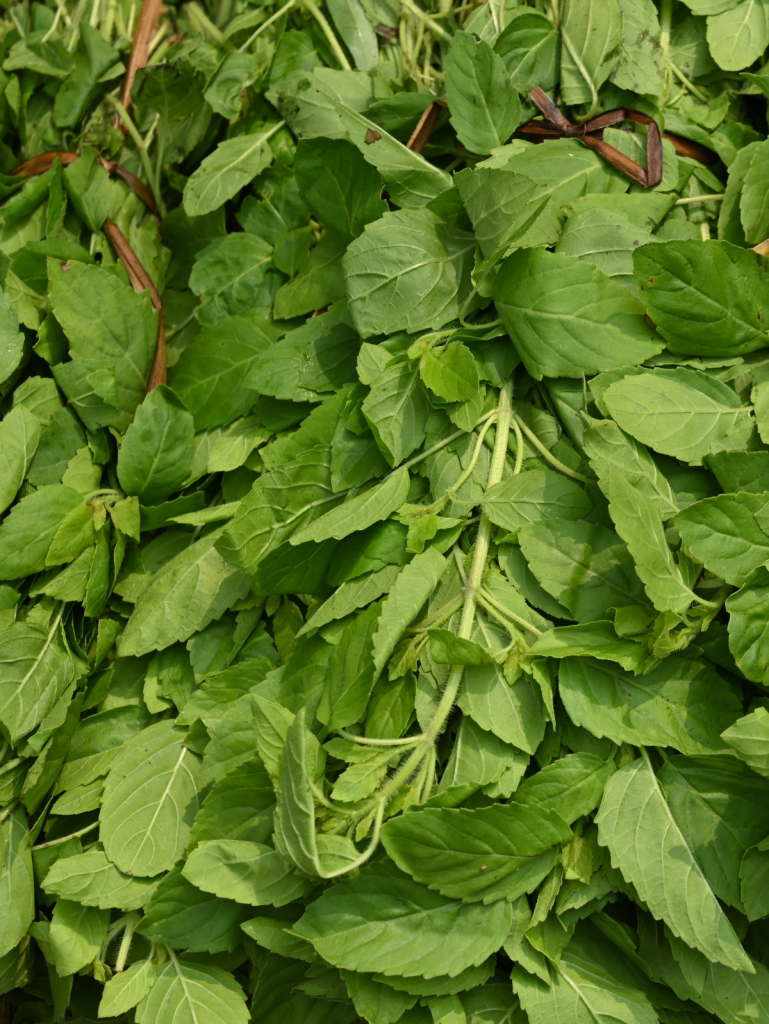
Immunity and Infections
Imagine your body as a bustling city, with the immune system as its vigilant security force, always ready to defend against invaders. Tulsi, also known as Holy Basil, plays a significant role as a VIP member of this security team. Revered in ayurvedic medicine, Tulsi, also called ocimum tenuiflorum or ocimum sanctum, is celebrated not just for its religious significance in the Indian subcontinent, but also for its numerous health benefits.
Tulsi for Immunity
The tulsi plant is like a power-up for your immune system. Its bioactive compounds work like a strong defense shield, helping the body fend off unwelcome guests. This sacred herb is packed with rosmarinic acid and ursolic acid, both known to enhance your body’s natural defenses. It’s like having an extra layer of armor protecting you from the daily attacks of the environment.
Immunity Boosting with Holy Basil
Scientific research backs up these claims! Various animal studies have shown that Holy Basil boosts immunity effectively by stimulating the production of antibodies. It’s like giving your immune system a little army to fight off invaders. The research suggests that regular consumption of Holy Basil, whether through tulsi tea or holy basil extract, can prep your body to stay strong and healthy.
Tulsi Antiviral Properties
Viruses, those microscopic troublemakers, are no match for Tulsi. Modern research and clinical studies have explored Tulsi’s antiviral properties. Holy basil oil and tulsi leaf extract are found to disrupt the replication of viruses. It’s like setting up roadblocks so these pesky agents can’t go any further within your system. This sets the stage for Tulsi to be part of potential cancer treatments and potentially critical support during viral outbreaks.
Tulsi Against Infections
When it comes to fighting infections, Tulsi is a versatile warrior. It has strong abilities against bacterial and fungal infections, thanks to its anti-inflammatory properties. Think of Tulsi as the holistic approach to healthcare, standing beside traditional prescription medications to offer a natural boost. Its effectiveness in combating bacterial infections and helping with skin diseases has been noted by ayurvedic practitioners for centuries.
Incorporating Tulsi into your daily routine, whether as tea, essential oil, or even in skincare products, could be your key to a more resilient health fortress. It’s no wonder Tulsi is dubbed the “queen of the herbs”!
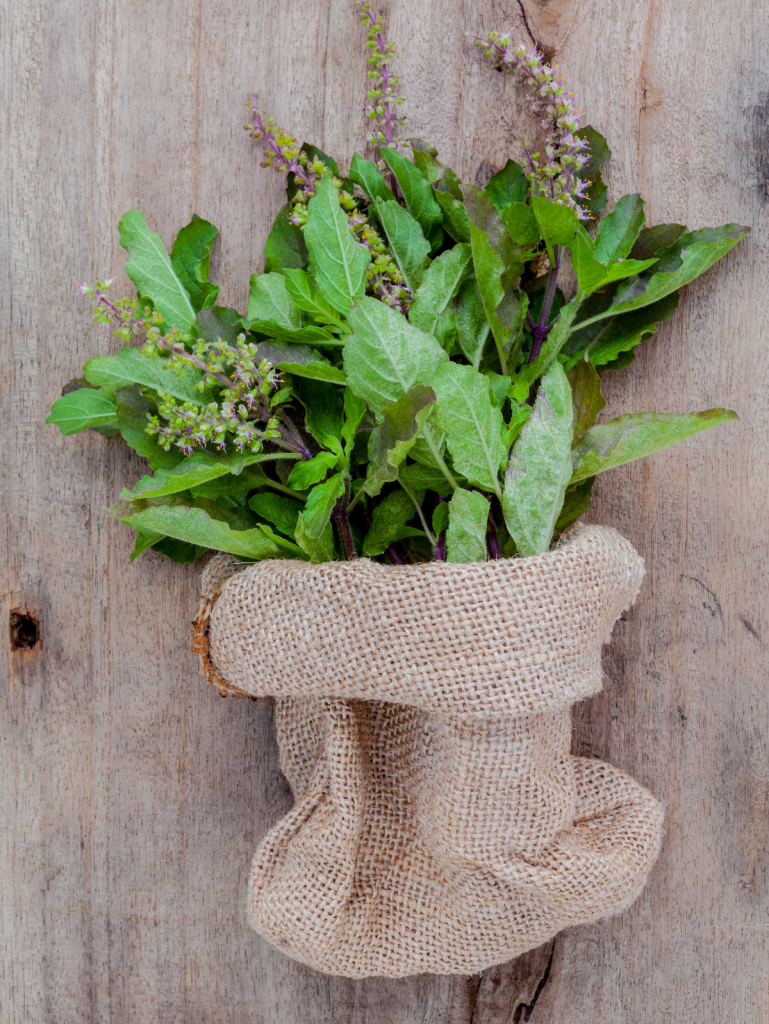
Stress and Mental Health
Feeling stressed? You’re definitely not alone. In our fast-paced world, finding natural ways to manage stress and boost mental health is more important than ever. Enter Tulsi, also known as Holy Basil, a plant with roots in ayurvedic medicine and a rich history of promoting wellness. Let’s explore how this sacred plant, also known as Ocimum sanctum or Ocimum tenuiflorum, can support your mental well-being.
Tulsi for Stress Relief
Stress is like an unwelcome houseguest that refuses to leave. Luckily, Tulsi might just be the friendly roommate you need. This sacred herb is celebrated for its adaptogenic properties, meaning it helps the body adapt to stress. Imagine you’re on a rollercoaster ride called life. Tulsi acts like the seatbelt, keeping you grounded as you navigate ups and downs.
Tulsi’s bioactive compounds such as ursolic acid and rosmarinic acid play an important role in reducing stress response. By neutralizing free radicals, which are tiny troublemakers in your body, Tulsi helps protect the nervous system from oxidative stress. Including Tulsi tea or holy basil tea as part of your daily routine can be a simple yet effective way to promote relaxation and balance.
Holy Basil Anxiety Benefits
Anxiety can feel like a chain that holds you back. Thankfully, Tulsi has shown potential in easing those binds. By influencing neurotransmitters in the brain, Tulsi can help calm your nerves and manage symptoms of anxiety.
There is scientific evidence suggesting that Tulsi’s anti-inflammatory properties may help support the adrenal glands, which regulate hormones responsible for dealing with stress. Think of Tulsi as a wise mentor, soothing your nervous system and guiding you towards a state of mental clarity and peace.
Mental Health Benefits of Tulsi
You might be wondering, “Can Tulsi really make a difference in mental health?” Studies suggest it can. Research has linked Tulsi to improvements in various mental health outcomes. For instance, systematic reviews have highlighted its ability to enhance cognitive function and support overall mental well-being.
Animal studies, as well as some human clinical trials, point to Tulsi’s potential benefits in boosting mood and reducing stress. Including Tulsi as part of a holistic approach to mental health might just be your ticket to a more balanced life. So, why not let Tulsi join your mental wellness toolkit and see the numerous health benefits it offers?
Incorporating this medicinal herb into your lifestyle, whether through Tulsi tea, holy basil extract, or Tulsi oil, can be a game-changer for maintaining mental health. Of course, it’s always wise to consult with a healthcare provider before making significant changes, especially if you’re on prescription medications or dealing with ongoing health conditions.
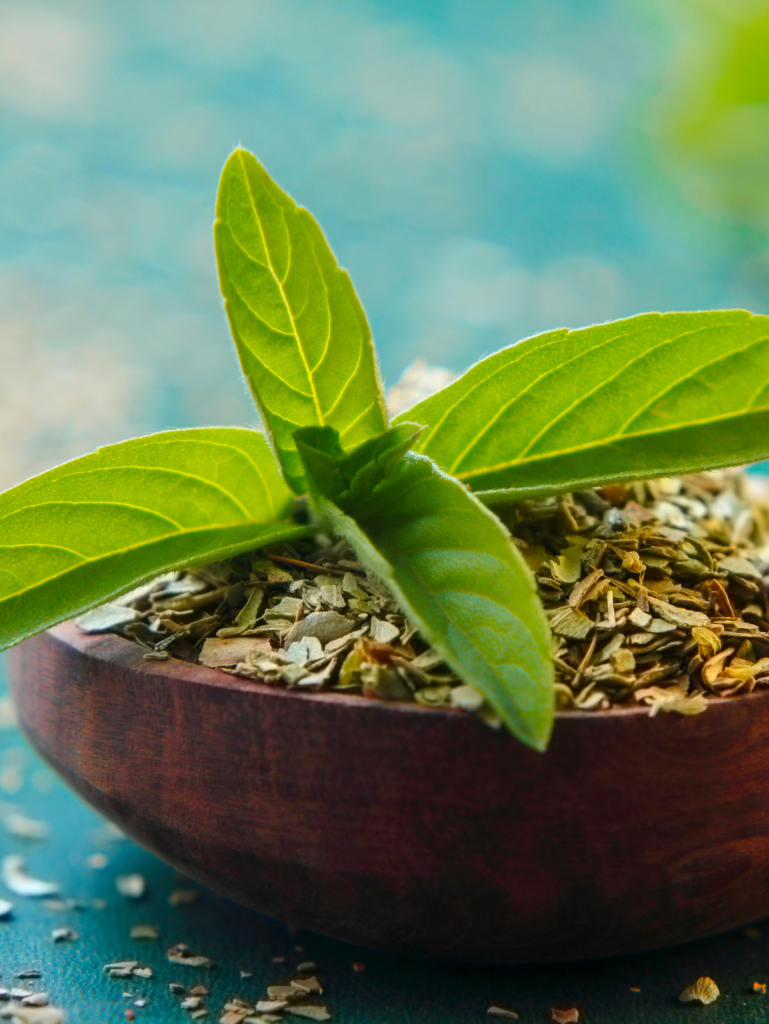
Skin and Hair Benefits of Tulsi
When it comes to beauty secrets, the tulsi plant, also known as Holy Basil, has earned its crown. Imagine a sacred herb that not only soothes your soul but also enhances your skin and hair. From tackling pesky skin issues to breathing life back into dull hair, tulsi is a one-stop solution! Let’s explore how this ancient remedy can become your next beauty staple.
Tulsi for Skin Care
Tulsi, or ocimum tenuiflorum, is a gem in the realm of skincare. This sacred plant is a powerhouse of bioactive compounds, including rosmarinic acid and ursolic acid, which are known for their amazing anti-inflammatory properties. These compounds help combat free radicals that can cause premature aging and dullness.
Wondering how tulsi tackles acne? Its natural essential oil acts as a gentle warrior against acne-causing bacteria. Plus, tulsi’s adaptogenic herb qualities help reduce stress, which is a sneaky culprit behind breakouts. Toss your chemical-laden creams aside and let tulsi leaves be your go-to for a clearer complexion.
Here are a few ways tulsi can amp up your skincare routine:
- Acne Treatment: Its anti-bacterial and anti-fungal properties help prevent and reduce pimples.
- Glowing Skin: Regular use in masks or toners can give you that radiant glow by improving blood circulation.
- Reduced Scarring: Helps in lightening scars and reducing redness.
Tulsi Benefits for Hair
Why settle for average hair when you can have fabulous hair with holy basil’s help? Tulsi is revered in ayurvedic medicine for its potential benefits on scalp health. It nourishes the scalp, wards off fungal infections, and fights dandruff, making it an essential part of any haircare regime.
Are you struggling with hair loss? This queen of herbs comes to the rescue by improving blood circulation and strengthening hair follicles, thanks to its vitamin C content. Some even call tulsi the liquid yoga for your hair because of its calming effect on the scalp, which can help manage adrenal fatigue and slow down hair shedding.
Keep these tulsi hair benefits in mind:
- Promotes Hair Growth: Regular application can boost hair growth and reduce hair thinning.
- Prevents Dandruff: Keeps the scalp clean and reduces the chances of dandruff.
- Enhances Shine: Adds a natural shine and softness that regular shampoos often strip away.
Incorporating tulsi into your daily routine can be a game-changer for your beauty game. Let this darling of Southeast Asia work its natural magic, and wave goodbye to bad hair days and troublesome skin forever!
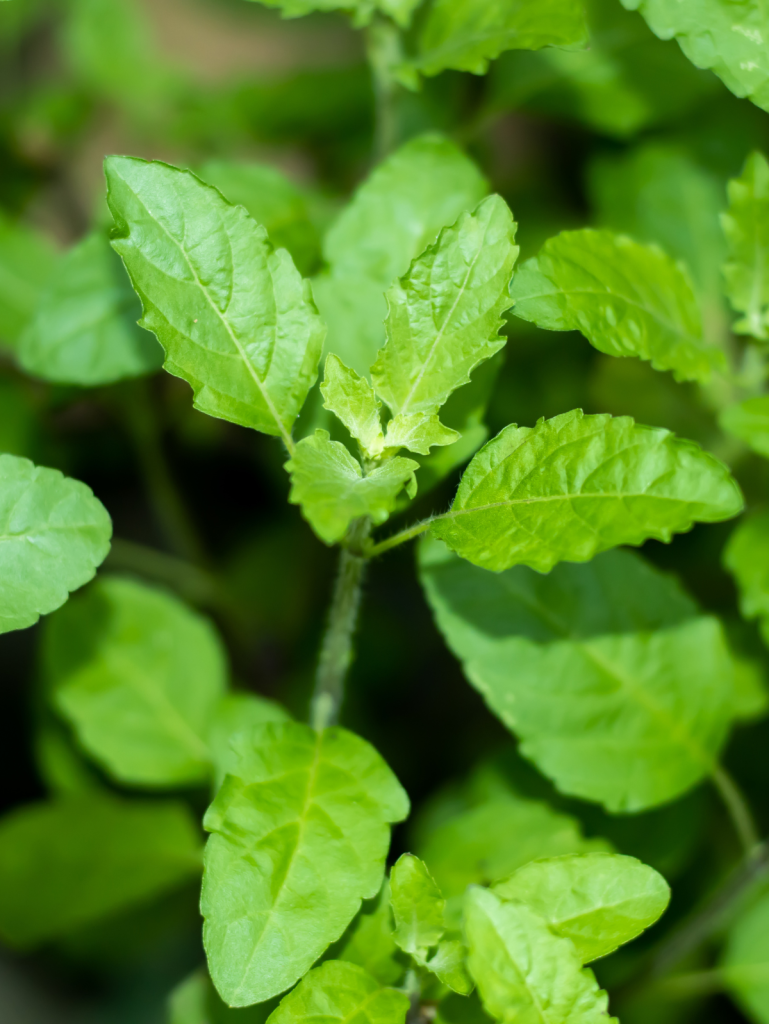
Respiratory Health
Breathe in, breathe out, feel the relief! The tulsi plant, also known by its scientific names ocimum tenuiflorum and ocimum sanctum, is a sacred herb treasured in ayurvedic medicine for its amazing benefits on respiratory health. Often referred to as the queen of the herbs, tulsi has been a natural remedy in the Indian subcontinent for centuries, providing comfort and peace to those battling respiratory issues. Let’s journey into how this sacred plant can help clear the airways and keep those pesky coughs at bay!
Tulsi for Respiratory Issues
Ever struggled with asthma or similar conditions and sought a natural remedy? Tulsi might just be the answer! Known for its impressive anti-inflammatory properties, tulsi can help reduce inflammation in the airways, making it easier to breathe. Rosmarinic acid, one of its powerful bioactive compounds, fights against free radicals and protects the lungs from damage. Plus, studies have shown tulsi’s essential oil has the potential to ease the effects of chronic obstructive pulmonary disease (COPD). While more scientific research is needed, these potential benefits make tulsi a promising player in managing respiratory health naturally.
Tulsi for Coughs and Colds
Oh, the dreaded coughs and colds! They always seem to hit at the worst times. Luckily, tulsi has been used in herbal medicine to provide relief to the sniffly and sneezy. Known for its medicinal properties, tulsi’s compounds help support the immune system, speeding up recovery and easing symptoms. Drinking warm holy basil tea can soothe your throat and reduce coughing fits, kind of like a comforting hug from Mother Nature. Its antioxidative power combats oxidative stress, aiding in quicker healing for your body.
When the seasons change and respiratory troubles come knocking, turn to tulsi, a beloved part of southeast Asia’s rich history of medicinal uses. Whether it’s through a warm cup of tea or the holy basil leaves in a steam inhalation, this medicinal herb serves as a natural ally in your daily routine aiming to keep you breathing easy.
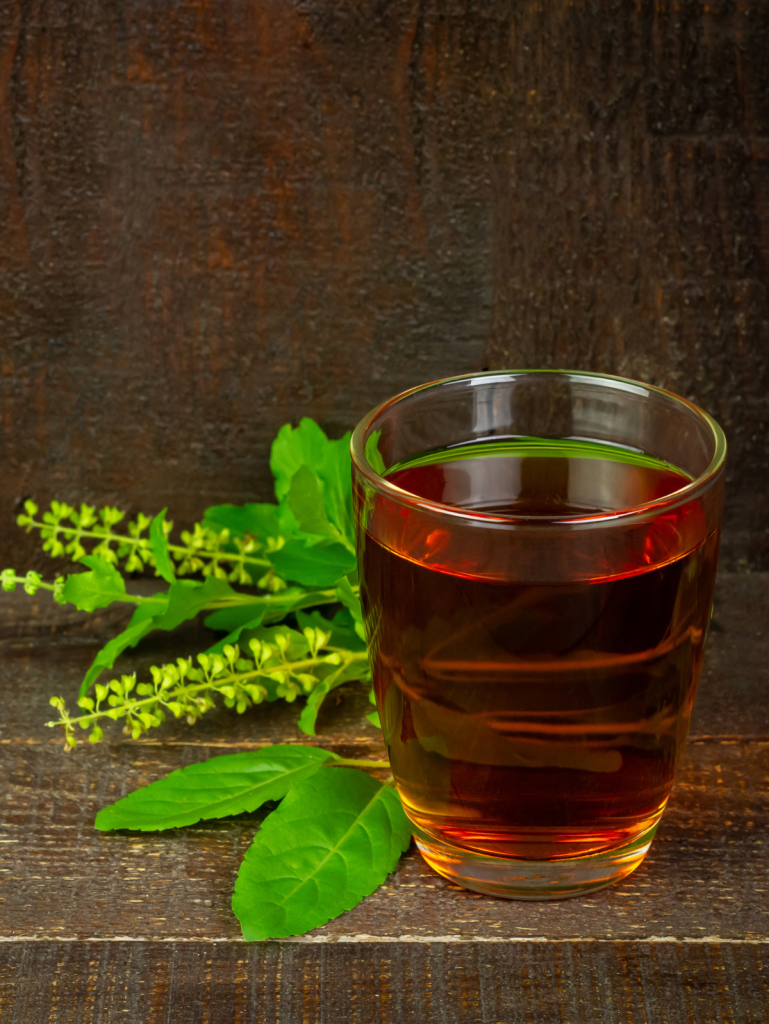
Tulsi Holy Basil Benefits: Weight Loss and Metabolism
Let’s take a moment to think about how amazing it would be to find a natural way to boost weight loss and metabolism. That’s where the tulsi plant, also known as holy basil, comes in. It’s not just a sacred herb in Ayurvedic medicine; it’s a powerhouse for managing weight and energizing your metabolism. Isn’t that something we all want?
Tulsi for Weight Loss
Wondering how tulsi can help shed those extra pounds? Modern research supports its potential benefits in weight loss. In some animal studies, tulsi has shown a promising role. Researchers found that extracts from the holy basil plant might help manage body weight by breaking down excess fat in the body. Amazing, right?
Not only does it help with fat breakdown, but the bioactive compounds in tulsi, such as ursolic acid, might also limit fat buildup. For those looking to maintain an active lifestyle or manage their weight naturally, this could be just what you need. It’s like having a secret weapon in your daily routine!
Holy Basil Metabolism Benefits
Metabolism seems like a big, complicated word, but it really just describes how our bodies turn food into energy. If your metabolic rate is high, you’re like a car running on rocket fuel! The aromatic leaves of tulsi are believed to give your metabolism a nice little turbo boost.
Why is this so? Tulsi contains an array of essential oils and compounds like rosmarinic acid, which may help enhance metabolic rate. This means that with tulsi, your body could potentially burn calories more efficiently. Who wouldn’t want that boost?
Plus, tulsi is renowned for reducing oxidative stress, which often bogs down metabolism. This effect is like clearing out the cobwebs in an old attic, letting your metabolism shine at its best.
In summary, whether you’re sipping holy basil tea or using tulsi oil, the potential to support your weight loss goals and rev up your metabolism with this medicinal herb is truly exciting. Add a dash of tulsi to your life—it just might be the difference you’ve been craving!
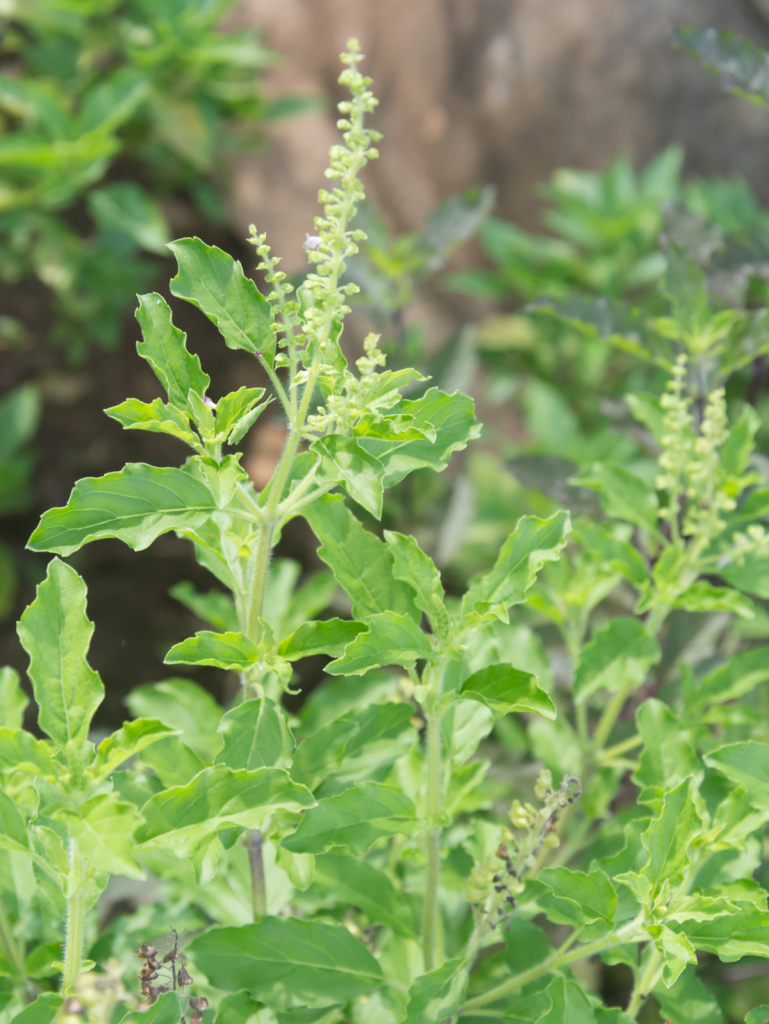
Anti-inflammatory and Antioxidant Benefits
Imagine a plant that wears a crown, revered as the “Queen of the Herbs.” The tulsi plant, also known as the sacred plant of the Indian subcontinent, has a rich history in ayurvedic medicine. This sacred herb, known by its scientific name Ocimum sanctum or Ocimum tenuiflorum, is more than just a pretty leaf. Whether you sip it as a soothing holy basil tea or use the essential oil in your routine, tulsi offers numerous health benefits that are worth understanding.
Tulsi Anti-inflammatory Properties
Tulsi’s anti-inflammatory properties work like nature’s soothing balm, helping to calm down the body’s fiery reactions. But how does it do this? Tulsi is packed with bioactive compounds that play an important role in reducing inflammation. These compounds block the signals that can lead to inflammation, much like stopping a chain of dominoes from toppling over.
Just think of it as a peacekeeper for your body. When your immune system misfires, causing inflammation, tulsi steps in to help restore order. This is particularly helpful for people dealing with chronic conditions where inflammation plays a key role. By including tulsi in your daily routine, you might experience a gentle nudge towards better health.
Antioxidants in Holy Basil
Now, let’s talk about antioxidants, the unsung heroes battling against free radicals. Tulsi is rich in antioxidants like rosmarinic acid and ursolic acid, which fight oxidative stress—a culprit behind aging and many diseases. It’s like giving your body a superhero cape to ward off invaders.
Consider this: antioxidants from holy basil not only support your immune function but also play a role in maintaining heart health, cognitive function, and even skin health. Regular use of holy basil extract or tulsi oil in skincare products can have you glowing from the inside out. With these antioxidants on your side, your body can better handle the daily grind and maintain vitality.
So, whether you’re worried about inflammation or want to protect your body against the sneaky effects of free radicals, tulsi may just be the medicinal herb you’re looking for.
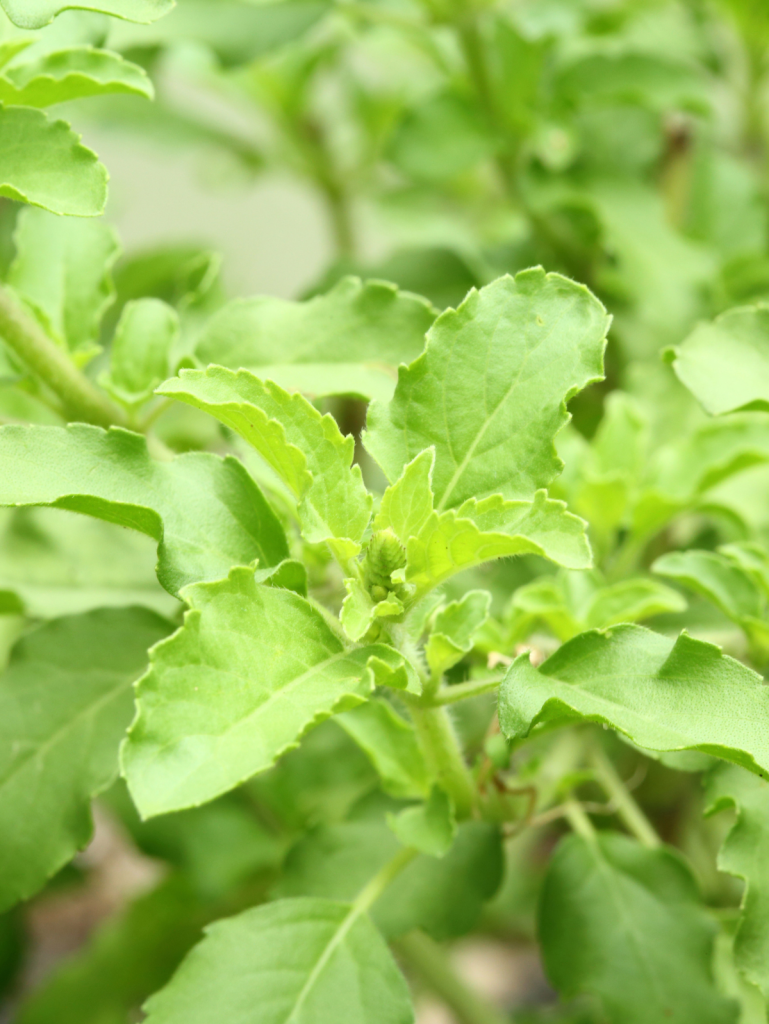
Digestive Health
When it comes to digestion, the sacred herb Tulsi, also known as “queen of the herbs,” stands out as a popular choice in Ayurvedic medicine. The tulsi plant, scientifically known as Ocimum sanctum or Ocimum tenuiflorum, has numerous health benefits, including improving your digestive system and gut health. Imagine Tulsi as a guiding force, gently steering your digestion down the right path, away from the chaos of bloating and discomfort.
Tulsi for Digestion
Tulsi can play an important role in enhancing your digestive health. Think of it like an essential oil for your digestive tract, soothing and calming every part. The aromatic leaves of Tulsi contain bioactive compounds like rosmarinic acid and ursolic acid, known for their anti-inflammatory properties. These compounds help reduce oxidative stress and fight free radicals, which can harm your digestive processes.
Some potential benefits of using Tulsi for digestion include:
- Soothing Stomach Issues: Holy basil tea made from tulsi leaves may ease common stomach problems such as gas, bloating, and cramps.
- Balancing Digestion: Incorporating tulsi extract in your daily routine can support balanced digestion by promoting the healthy breakdown of food.
- Supporting Nutrient Absorption: By calming the digestive tract, Tulsi ensures that your body absorbs essential nutrients more effectively.
Including Tulsi in your diet can feel like adding a trusted advisor to your digestive system—a little plant with big benefits.
Gut Health Benefits of Tulsi
The relationship between Tulsi and gut microbiome balance is like a well-orchestrated symphony, where every player knows their part. Gut health is crucial for overall wellness, and Tulsi’s medicinal purposes extend to maintaining this balance. The holy basil plant supports the growth of good bacteria in the gut, which helps strengthen the immune system and improve mental health.
Here’s how Tulsi can boost your gut health:
- Encourages Healthy Bacteria: Holy basil encourages the proliferation of beneficial bacteria, which help keep harmful bacteria and fungal infections at bay.
- Reduces Inflammation: Thanks to its anti-inflammatory properties, Tulsi helps control inflammation in the gut, enhancing digestive comfort and function.
- Boosts Immunity: A balanced gut microbiome aided by Tulsi can boost your immune function, leading to fewer digestive and immune-related problems.
Using Tulsi for gut health is like planting a flourishing garden in your digestive system—full of life and vitality. As modern research and scientific studies continue to explore the health benefits of holy basil, the sacred plant remains a go-to option for a holistic approach to digestive wellness.
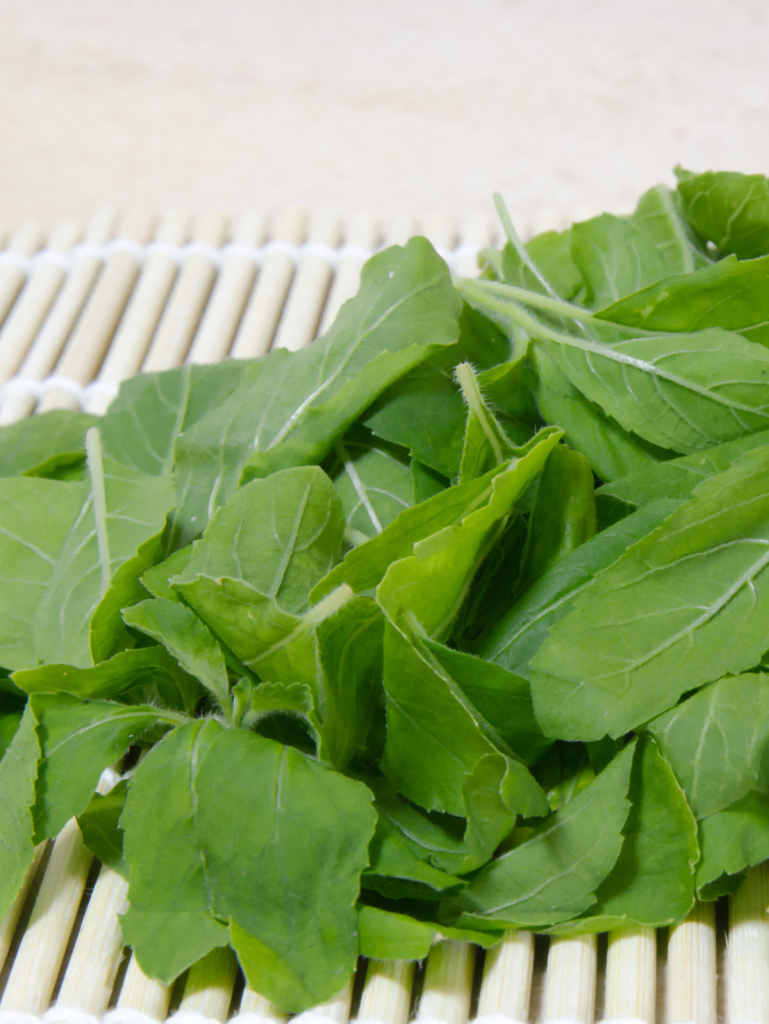
Traditional and Ayurvedic Uses of Tulsi
Tulsi, also known as Holy Basil, has an esteemed place in both traditional and Ayurvedic medicine. With a rich history spanning centuries, Tulsi, or Ocimum sanctum, is not just a sacred plant, but a hub of numerous health benefits.
Tulsi in Ayurveda
In the holistic world of Ayurvedic medicine, Tulsi is hailed as the “queen of the herbs.” Ayurvedic practitioners incorporate this sacred herb for its potential benefits on the nervous system, immune system, and its unique ability to balance the Kapha dosha. But what sets Tulsi apart in Ayurvedic practices?
- Adaptogenic Qualities: As an adaptogenic herb, Tulsi helps the body adapt to stress, supporting the adrenal glands and improving the overall stress response.
- Bioactive Compounds: With compounds like ursolic acid and rosmarinic acid, Tulsi contributes to anti-inflammatory properties and alleviates oxidative stress caused by free radicals.
- Vital Roles: Whether you’re battling mental fatigue or aiming for better cognitive function, Tulsi plant plays an important role. It’s like having a supportive friend who’s always got your back.
Traditional Uses of Holy Basil
Tulsi has been more than just a plant in the Indian subcontinent—it’s a living tradition. Its use of holy basil spans cultural and historical boundaries. Here’s a glimpse into its past:
- Religious Significance: Often found in Hindu households, Tulsi is revered as a sacred plant, embodying spiritual purity. It’s like the heart of the home, welcoming both peace and protection.
- Medicinal Purposes: From holy basil tea for soothing the throat to tulsi oil in skincare products, the medicinal uses of Tulsi have been vast. It’s used for skin diseases, mouth ulcers, and even dental care.
- Historical Recipes: Generations have used Tulsi leaves in decoctions to manage blood pressure and cholesterol levels. Think of these remedies as ancient versions of today’s healthcare trends.
This rich tapestry of historical and Ayurvedic uses underpins why Tulsi remains a powerhouse in traditional medicine. Whether it’s part of your daily routine through refreshing cups of tulsi tea or as a key ingredient in modern holistic approaches, Tulsi’s legacy continues to thrive across cultures.
How to Use Tulsi
Exploring the tulsi plant is like unlocking a treasure chest of health benefits that have been cherished for centuries in Southeast Asia and the Indian subcontinent. Often called the “queen of the herbs,” tulsi, or Ocimum sanctum, serves an important role in ayurvedic medicine due to its numerous health benefits and medicinal properties. But how can you easily introduce this sacred herb into your daily routine? Let’s find out how to embrace tulsi’s power with a modern twist.
Ways to Consume Tulsi
The beauty of tulsi is in its versatility. You can incorporate it into your lifestyle in various forms:
- Holy Basil Tea: Sip on the delightful aroma of tulsi tea to boost your immune system. Perfect for starting or ending your day!
- Supplements and Extracts: Handy and efficient, these can be effortlessly added to your regimen. The holy basil extract packs a punch by reducing oxidative stress and balancing blood sugar levels.
- Essential Oils: The aromatic magic of tulsi oil is not only soothing but also great for your skin, thanks to its anti-inflammatory properties.
- Raw Leaves: Chewing fresh holy basil leaves? Yes! They can combat mouth ulcers and elevate your oral health.
- Skincare Products: Enrich your beauty routine with tulsi-infused skincare products that harness its medicinal properties.
These options make incorporating tulsi as easy as pie, whether you’re a fan of teas, supplements, or sweet basil whiffs—there’s something for everyone!
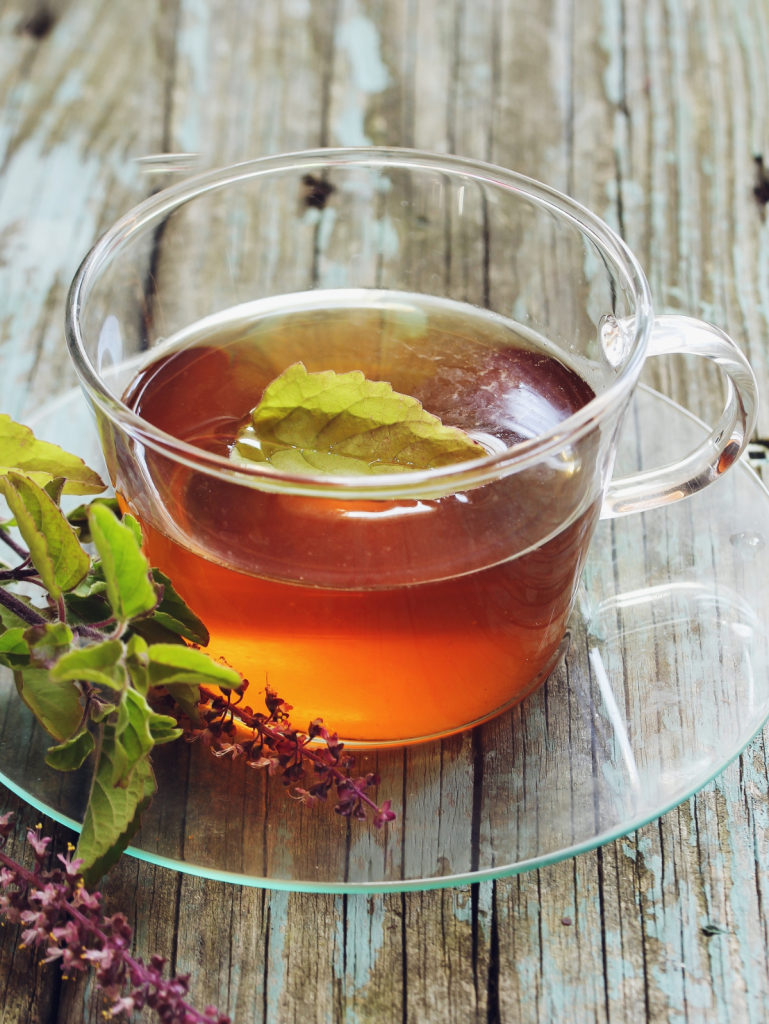
Tulsi Tea Preparation
Ready to whip up some holy basil tea? This is a cozy ritual that blends tradition with a simple, modern recipe. Here’s how you can brew this delightful concoction at home:
Ingredients:
- Fresh tulsi leaves (about 10-15) or dried leaves (1 tablespoon)
- 2 cups of water
- A pinch of rosmarinic acid-rich sweetener, like honey (optional)
- A squeeze of lemon (optional)
Instructions:
- Boil the Water: In a small pot, bring 2 cups of water to a roaring boil.
- Add Tulsi: Toss in either your fresh leaves or dried ones. Feel free to add a few sprigs of Rama tulsi or Krishna tulsi for added variety.
- Simmer: Lower the heat and let it simmer for about 5-7 minutes to allow those bioactive compounds to infuse properly.
- Strain: Carefully strain the tea into your favorite mug.
- Sweeten and Flavor: Stir in a bit of honey or apple cider vinegar if you fancy a twist, and add lemon juice for a zesty kick.
And there you have it—a cup of liquid yoga to enhance your mental clarity and support your nervous system.
This tea not only warms you from within but also brings the rich history of the tulsi plant into every sip, empowering your health care approach with centuries-old wisdom. Enjoy, and cheers to your health!



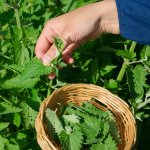
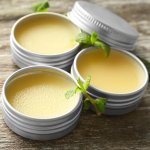


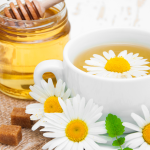

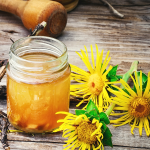
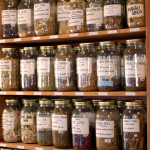
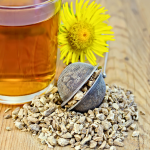

Leave a Reply